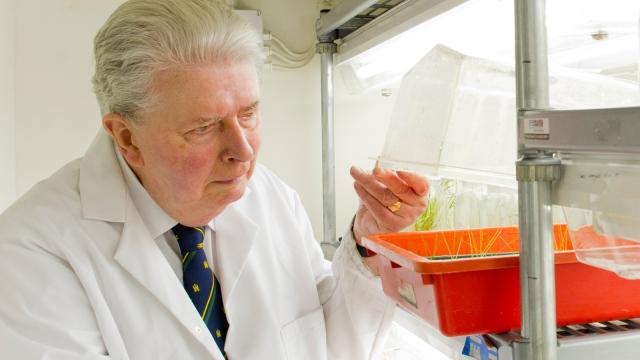We’ve been using nitrogen fertilisers to bolter crop growth since the neolithic era. But producing enough food for nearly seven billion mouths requires intensive farming farming practices that demand heavy applications of fertilisers. And their overuse is taking a heavy toll on the environment — an estimated $US91 billion to $US428 billion worth of damage in Europe alone.
Until now, the ammonia and nitrogen oxide emissions from fertiliser plants and the massive aquatic dead zones downstream from farms caused by nitrogen runoff-fueled algae blooms have all been considered necessary evils in the name of agriculture, because pumping fertiliser into the soil is the only way to get plants their nitrogen fix. Except that now, a University of Nottingham researcher just figured out how to coerce every crop plant on Earth to pull nitrogen directly from the atmosphere. No fertiliser required.
A building block of amino acids, proteins, and DNA, nitrogen is a vital nutrient for plants and animals alike. But unfortunately very few plants can absorb nitrogen directly from the air. They must wait for bacteria in the soil to convert it to ammonia and ammonium, a process known as nitrogen fixation, which they then absorb through their roots and convert back into nitrate for use.
The few plants that can pull atmospheric nitrogen, specifically legumes like peas and beans, do so with the help of symbiotic cyanobacteria that perform the nitrogen fixation within the plant itself. And it’s this mutually beneficial relationship that Prof. Edward Cocking, director of the University of Nottingham’s Centre for Crop Nitrogen Fixation, has developed for the world’s crops.
The technique, dubbed N-Fix, doesn’t involve modification of the crop’s genome. It involves a specific strain of nitrogen-fixing bacteria commonly found in sugar cane that has no qualms about colonizing the cells of other plant species. Most of these symbiotic bacteria have evolved to live only in specific plants but Cocking’s bugs are happy to set up shop anywhere, including all of humanity’s major food crops. N-Fix is applied as a seed coating, whereupon the bacteria penetrate every cell of the growing plant and impart their nitrogen fixing abilities.
The university has been conducting proof of concept and safety studies for more than a decade now. It recently licensed the technology to Azotic Technologies Ltd which is conducting field trials for regulatory approval in the UK, Europe, USA, Canada, and Brazil. There’s no word yet on how long that will take — but once this method takes hold, it’s going to change the world. [U of Nottingham – Lenntech]
